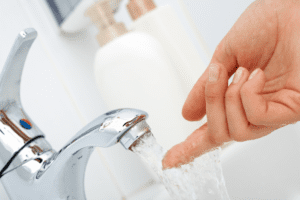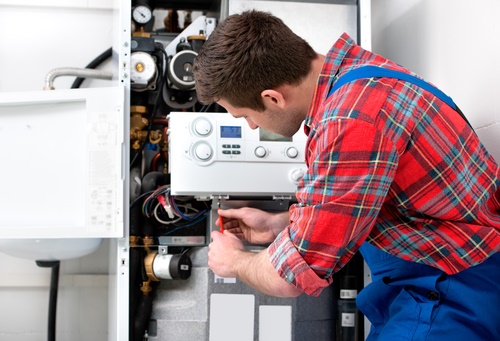When you’re searching for an effective way to heat your home, it’s essential to consider all the options. One choice frequently selected for efficiency is a hot water heating system, usually involving a baseboard distribution system. As with everything else, it has pros and cons, so balancing them is a matter of identifying the needs of your building.
How the Baseboard System Works
 Baseboard and radiator hot water systems use the same approach to deliver heat throughout the building. There are several steps involved:
Baseboard and radiator hot water systems use the same approach to deliver heat throughout the building. There are several steps involved:
- A boiler uses electricity, oil, or gas to heat water, and can be attached to the water heater for your taps, showers, etc., or it can be a separate unit. In either case, the boiler heats a constant amount of water that gets pushed through the system in a circuit.
- The heated water is pumped throughout the building using a series of pipes from the boiler to each room. The heated water takes up more space than cool water, so the system also has a way to balance the added pressure by using compressed air.
- There are baseboards or radiators heaters in each room, connected to the hot water pipes. Hot water enters from one side, cycles through the radiator, then exits the other end having transmitted heat to the radiator. The surface area of the baseboard or radiator heats the surrounding air, which then rises and spreads throughout the room.
- The water returns to the boiler to be heated once more, then cycled through the system again. Inevitably, there is a decrease in water due to evaporation and escape, so to maintain the constant amount of water, there is also a storage tank or additional valve that adds water to make up for the loss.
This circuit distributes heat through the building efficiently. By continually moving the water, it does not lose all its heat during a cycle, meaning that once the hot water system is up to temperature, it requires less energy to maintain at that rate. Although it lacks the power of a forced air system, this approach to heating a home tends to keep energy costs relatively low compared to oil or gas furnace heat.
Benefits and Drawbacks of a Water Heating System
As mentioned, one of the most compelling advantages for a water heating system is the relative savings that come with the system. Once the system is installed, it requires minimal maintenance on the part of the homeowner, instead only requiring service rarely when an issue arises. If an extended time elapses before you use the heater again, it may need draining to release any trapped air bubbles. Draining or bleeding is easily done using a radiator key and a bowl to catch the water.
Another notable advantage of this kind of heater is the fact that undisturbed air spreads less dust. You can reduce the risk of allergic reactions to those who are sensitive to dust and may also reduce the frequency of dusting (though keeping a tidy home is always a good idea). Further, the radiated heat doesn’t pull any moisture out of the air, so those with sensitive or dry skin may prefer this to a forced air system.
There are nevertheless some drawbacks to this style of heater. One of the significant issues is the uneven distribution of heat. All the radiators are on a single circuit so that the first radiator will be pumping out heat at full temperature, but the last in the series may be noticeably cooler. Depending on the location of the thermostat, this can result in a situation where one room is perennially cold.
Just as with any other system, all the parts need to be functioning for the system to work correctly. If the pump or boiler stops working, the water will either stagnate or remain cold. Should a leak or clog occur along the pipes or in the radiator, that will also have a severe impact on your system’s function. Speak with qualified HVAC technicians about some ways you may improve your system’s performance and maintenance to offset the disadvantages of hot water heat.
Making an Informed Decision About Home and Office Heating
There are certainly reasons to install a water heating system; homeowners should strongly consider it. Business owners, on the other hand, may find that the limitations of the system are too much to warrant its use in a commercial setting. A large store or office may require too many radiators for a reasonable system to handle, and the size of the building may call for faster action from a forced air system.
As with any other system, however, you need to practice proper maintenance to ensure it remains in good order. We recommend finding a reliable HVAC technician who can address whatever issues you’re encountering. With routine maintenance, you’ll find that any central heating system will last you for years to come.



